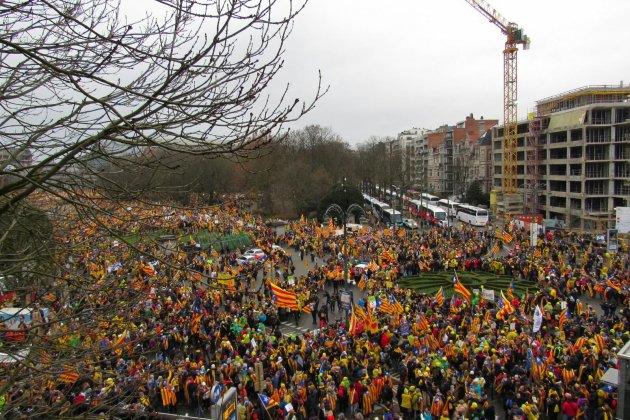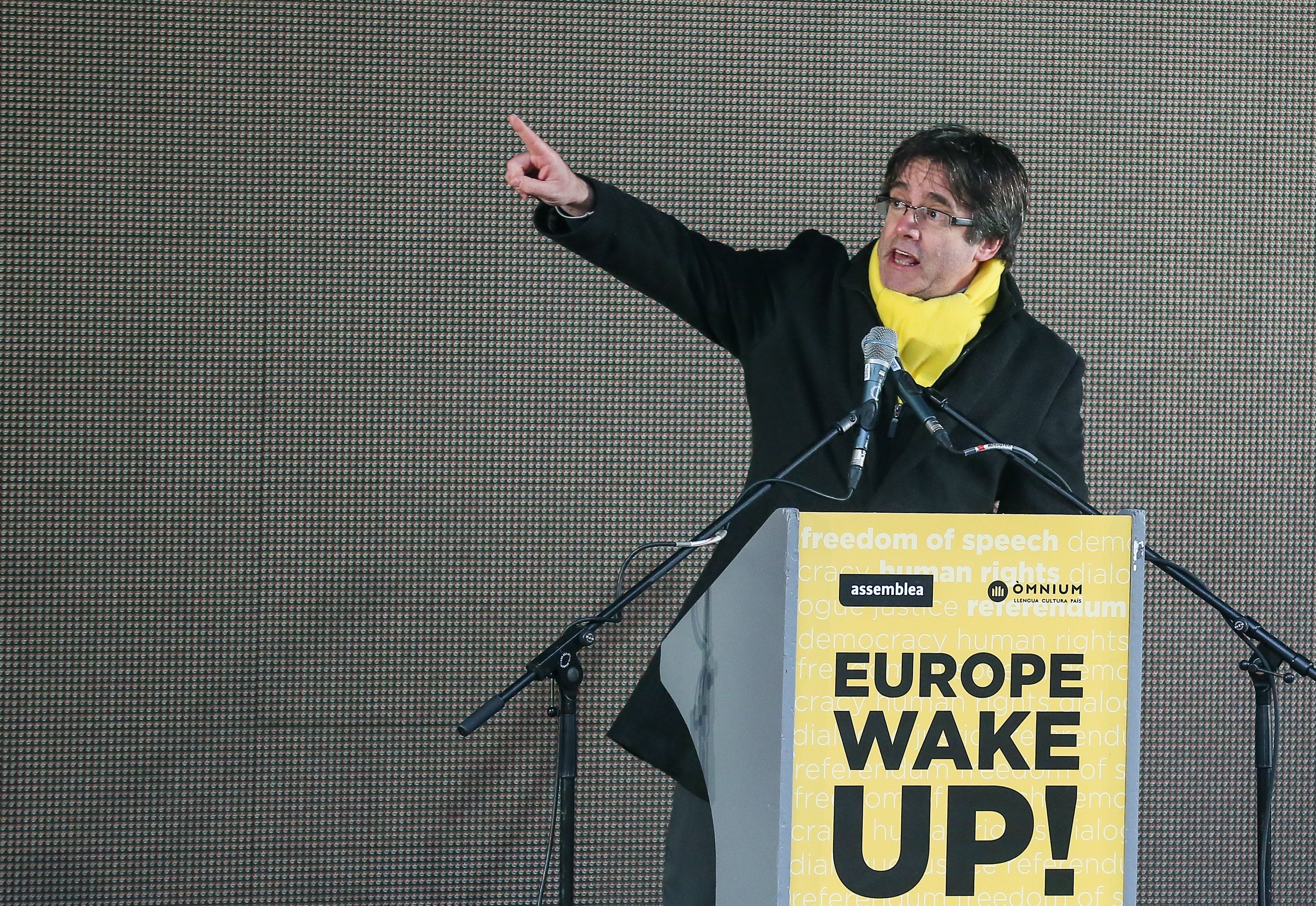From the heart of Europe and in front of the 45,000 Catalans who have protested this cold, wet morning in Brussels, president Carles Puigdemont has sent a message to the European institutions. The president called on Europe to listen to its citizens and not just countries and to not be scared of saying "no, not like that" to member states when they don't respect basic rights.

Foto: Júlia Ferré
This was a direct call, with a hint of anger, addressed both implicitly and explicitly to the president of the European Commission, Jean-Claude Juncker.
"We want a Europe that listens to its citizens as well as listening to its member states. Obviously it has to listen to its states, but not only to its states. It also has to listen to its citizens," he said, continuing that "it shouldn't be scared to say 'no, not like that' to one of its members which doesn't respect basic rights".
Puigdemont, who was welcomed by shouts of "president", started his speech with a nod to vice-president Oriol Junqueras, minister Joaquim Forn and the leaders of pro-independence organisations ANC (Catalan National Assembly) and Òmnium, Jordi Sànchez and Jordi Cuixart. He thanked the organisers for their efforts and, in French, the Belgian police, which has seen itself overwhelmed today by a turnout it did not expect and whom he applauded for "their demonstration of what it means to be a democratic police force".
Puigdemont called on what he called a Europe "under construction", helped
Making Europe proud
"When millions of people demonstrate repeatedly so peacefully and with such organisation, that has to make Europe proud, because it's the way that things have to be transformed, with the people," he said.
As such, he said that when members of pro-independence organisations are imprisoned and when the legitimate government is imprisoned or forced to go into exile and Europe dedicates itself to encouraging Rajoy for his repression, "marvellous things like today" happen. Instead of distancing Europe's citizens, it brings them even closer.
At this point, he directly addressed the president of the European Commission in French to ask him whether he had ever seen such a mobilisation to support criminals. He therefore advised him to ask Rajoy why he treats the Catalan government as criminals the first time he sees him.
Junqueras' letter
Before Puigdemont came the secretary general of ERC (Catalan Republican Left), Marta Rovira, reading a letter from the head of her party, vice-president Oriol Junqueras, written the day after a Supreme Court judge decided to keep him held on remand and not offer bail. Six fellow ministers, including his cellmate Carles Mundó, were released.
Junqueras reported a profound feeling of injustice, difficult to handle emotionally, accusing them of wanting to cause unnecessary harm. "Continue, never give out", said the vice-president, calling for the public to vote in the 21st December election.
The state doesn't play clean
After reading the letter, Rovira denounced that Junqueras, like minister Forn and the 'Jordis' are in prison because the Spanish state doesn't play clean. "They don't know how to play clean because they're scared of democracy because they know we'll win again," she said.
The ERC leader expressed her surprise that the state doesn't realise that the objectives which drive the independence movement are freedom, modernity and justice, and that it won't stop until it achieves them. She also warned that if the pro-independence parties don't win the 21st December election, Ciutadans (Citizens) will and they "will destroy the model of the country we have constructed, Catalan in schools, public television, the security service...". She also noted a number of social policy laws passed in Catalonia which the Spanish government has overturned.
"Stubborn as we are, we won't stop until the end!" she said in an animated speech, ending: "we remain stubbornly mobilised, determined to win a fairer, more decent country!"
The speeches from the politicians started with those from the four ministers in Brussels: Clara Ponsatí, Meritxell Serret, Lluís Puig and Toni Comín. Comín warned that turning back would mean that all their efforts, their exile and imprisonment would have been for nothing. "If you continue forwards, all these sacrifices not only will not have been in vain, but will be the seed of our freedom. Fascism doesn't destroy us," he said.
A new yellow star
"The EU flag will have a new yellow star", said ANC vice-president Agustí Alcoberro in his speech at the end of the demonstration. He also denounced that "it's impossible [to have] a political debate with the Spanish state like those had in Scotland or Quebec". He recalled the police violence during the 1st October referendum and said that "the reaction from the Spanish state [to the independence process] has been exclusively through the law and the police".
For all these reasons, he called on the EU to change its attitude. He called Catalan society "open and pluralistic" and its capital, Barcelona, "cosmopolitan and vibrant" in a speech switching between English, French, Catalan and Spanish.
For his part, the spokesperson for Òmnium Cultural, Marcel Mauri, condemned the "repression, the state's violence and the political prisoners". "You cannot imprison a people", he said, adding that it's a question of democracy "for Catalonia, but also for Spain and for Europe".
Mauri said that Catalonia is looking to Europe "with hope" and argued that what is happening is an "embarrassment for any democrat" because "fundamental rights are at risk".

